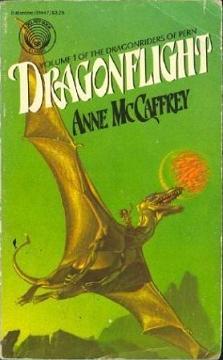
Dragonflight
Anne McCaffrey
303 pages
published in 1968
Because I've been running my booklog since 2001 I know it's at least a decade or more since I'd last cracked open an Anne McCaffrey novel, yet once upon a time her < cite>The Dragonriders of Pern series was very important to me. Like so much science fiction and fantasy I discovered the Pern books through the local library, first reading them in Dutch, then continuing in English after I discovered the later books were only available that way. Over the years I devoured everything of McCaffrey I could lay my hands on, but I got less and less enjoyment out of her later novels, until I stopped reading them all together. Which is why I hadn't read her in more than a decade and why it took her death to get me to reread the Pern novels. Which is a shame, as rereading them now makes clear how good McCaffrey at her best really was.
And Dragonflight was the best story she ever wrote. The two novellas that form the first twothirds of it, "Weyr Search" and "Dragonflight were rewarded with a Hugo and a Nebula Award respectively and are worth it. I had remembered Dragonflight as a fairly light novel, but it actually starts out quite dark, with Lessa, its heroine being the sole survivor of a coup against her family, plotting revenge as a kitchen drudge against the evil lord Fax who had taken over her hold. She's not a nice person at all at the start of the story, completely focused on getting her own back and on making the hold as miserable as possible. But she also has a secret, a bond with the watch wher, a telepathic reptile like animal used as a watchdog. Little does she know that this is a hint to a much greater destiny for her...
Meanwhile F'Lar, a wingleader at Benden Weyr, where the last remaining dragonriders of Pern live. Once upon a time there were six Weyrs, to defend Pern from the dangers of Threadfall, spores drifting in from Pern's sister planet the Red Star, but the last threadfall was hundreds of Turns ago, five of the Weyrs have been abandoned and the Holds, where the bulk of population lives have forgotten their obligations to the Weyrs, while the Weyr itself has forgotten its duty to Pern and nobody longer believes in Thread. Nobody but F'lar that is, and his brother F'Nor, who still keep the old traditions in honour. And now F'lar is visiting Ruantha Hold, Lessa's Hold, looking for candidates for Impression, for young girls to bond with newly born dragons as the next generation of dragonriders. Three guesses who becomes one of the candidates...
But this is just the start of Lessa's and F'lar's adventures. There's still the menace of Threadfall to overcome, the resistance of the Holds to the Weyr and the continuing problem of how one small Weyr of dragonriders can protect the entire planet when it needed six much bigger Weyrs in the past, with much more experienced and better prepared riders... Both Lessa and F'lar have their roles to play in resolving this, but Dragonflight is largely Lessa's story.
Dragonflight was written in 1968/69, long before the fantasy boom of the seventies, when fantasy was still very much an offshoot of science fiction. A lot of the tropes and cliches of epic fantasy can be seen in embryonic form here and I suspect Ann McCaffrey's dragons have had just as much influence on the shaping of genre fantasy as Tolkien's hobbits have, even if it's less recognised. But Dragonflight isn't quite fantasy, even if it has firebreathing flying dragons, a medievaloid society and a fight against unreasoning evil at the heart of its story.
Because the dragons are genetically engineered from the fire lizard indigenous to Pern, the unreasoning evil is just an alien lifeform doing what it must do to survive and spread itself, while the medievaloid society is the descendant of colonists from Earth who had to abandon most of their high technology because Pern wasn't suited for it combined with the pressures of Threadfall, which explains why there are Holds but no cities: Thread can't burn stone so people live in cages and other rocky places. What's more, these explanations for the dragons et all aren't there just as handwaving: scientific curiosity plays a huge part in the plot of Dragonflight and its sequels as the Pernians rediscover the world they're living on. That's part of the appeal of The Dragonriders of Pern for me, that process of discovery, though it would get a bit silly in the later novels.
Another part of what made Dragonflight and the other dragon novels so popular and important for so many people for such a long time is Anne McCaffrey's ability as a writer to suck you into the story, what Jo Walton called readability when discussing John Wyndham: "the ability to write a sentence that makes you want to keep reading the next sentence and so on and on". McCaffrey had that in spades, where no sooner have you finished the first novel, you want to start the next one.
Which is just what I did.
Webpage created 04-12-2011, last updated 20-02-2012.